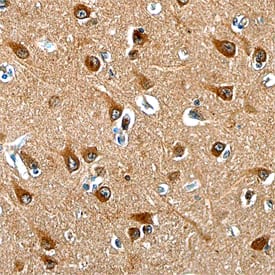NGL-1/LRRC4C Products
Netrins have been identified as midline-derived chemoattractants that guide axons to the midline during development. Netrins are antagonized by Slit and Robo proteins which compete for DCC (deleted in colorectal cancer) receptor binding. Netrins also have axon repulsion effects when interacting with the UNC5 (uncoordinated-5) receptor family, either alone or with DCC receptors. Netrins are a laminin-related family of matrix-binding secreted proteins containing an N-terminal laminin gamma-chain-related globular domain (domain VI), three laminin EGF-like repeats, and a C-terminal heparin-binding domain.
Netrin-G1a and Netrin-G2a are members of the GPI-linked Netrin subfamily distantly related to classic Netrins. Membrane-bound G-type Netrins are suggested to promote neurite outgrowth and perhaps impact neuronal plasticity. G-type Netrins are found only in vertebrates. Netrin-G1a and Netrin-G2a contain an N-terminal laminin globular domain (domain VI) followed by 3 laminin EGF-like repeats, and a C-domain with a hydrophobic signal for glycosylphosphatidylinositol (GPI) lipid linkage. The Netrin-G2a molecule also contains a C-terminal heparin binding site.
10 results for "NGL-1/LRRC4C" in Products
10 results for "NGL-1/LRRC4C" in Products
NGL-1/LRRC4C Products
Netrins have been identified as midline-derived chemoattractants that guide axons to the midline during development. Netrins are antagonized by Slit and Robo proteins which compete for DCC (deleted in colorectal cancer) receptor binding. Netrins also have axon repulsion effects when interacting with the UNC5 (uncoordinated-5) receptor family, either alone or with DCC receptors. Netrins are a laminin-related family of matrix-binding secreted proteins containing an N-terminal laminin gamma-chain-related globular domain (domain VI), three laminin EGF-like repeats, and a C-terminal heparin-binding domain.
Netrin-G1a and Netrin-G2a are members of the GPI-linked Netrin subfamily distantly related to classic Netrins. Membrane-bound G-type Netrins are suggested to promote neurite outgrowth and perhaps impact neuronal plasticity. G-type Netrins are found only in vertebrates. Netrin-G1a and Netrin-G2a contain an N-terminal laminin globular domain (domain VI) followed by 3 laminin EGF-like repeats, and a C-domain with a hydrophobic signal for glycosylphosphatidylinositol (GPI) lipid linkage. The Netrin-G2a molecule also contains a C-terminal heparin binding site.
| Reactivity: | Human |
| Details: | Sheep IgG Polyclonal |
| Applications: | WB |
| Reactivity: | Human |
| Details: | Mouse IgG1 Monoclonal Clone #755720 |
| Applications: | IHC |
| Source: | NS0 |
| Accession #: | NP_065980 |
| Applications: | Bind |
| Reactivity: | Human |
| Details: | Sheep IgG Polyclonal |
| Applications: | WB |
| Applications: | WB |
| Reactivity: | Human |
| Details: | Mouse IgG2a Kappa Monoclonal Clone #1G5 |
| Applications: | WB, ELISA |
| Reactivity: | Human |
| Details: | Rabbit IgG Polyclonal |
| Applications: | IHC |
| Reactivity: | Human |
| Details: | Rabbit IgG Polyclonal |
| Applications: | ICC/IF |
| Applications: | AC |




![Western Blot: NGL-1/LRRC4C Overexpression Lysate [NBP2-06594] Western Blot: NGL-1/LRRC4C Overexpression Lysate [NBP2-06594]](https://resources.bio-techne.com/images/products/Netrin-G1-ligand-Overexpression-Lysate-Adult-Normal-Western-Blot-NBP2-06594-img0001.jpg)
![Western Blot: NGL-1/LRRC4C Antibody (1G5) [H00057689-M05] Western Blot: NGL-1/LRRC4C Antibody (1G5) [H00057689-M05]](https://resources.bio-techne.com/images/products/NGL-1-LRRC4C-Antibody-1G5-Western-Blot-H00057689-M05-img0002.jpg)
![Immunohistochemistry-Paraffin: NGL-1/LRRC4C Antibody [NBP3-17662] Immunohistochemistry-Paraffin: NGL-1/LRRC4C Antibody [NBP3-17662]](https://resources.bio-techne.com/images/products/NGL-1-LRRC4C-Antibody-Immunohistochemistry-Paraffin-NBP3-17662-img0001.jpg)
![Immunocytochemistry/ Immunofluorescence: NGL-1/LRRC4C Antibody [NBP2-58242] Immunocytochemistry/ Immunofluorescence: NGL-1/LRRC4C Antibody [NBP2-58242]](https://resources.bio-techne.com/images/products/NGL-1-LRRC4C-Antibody-Immunocytochemistry-Immunofluorescence-NBP2-58242-img0001.jpg)